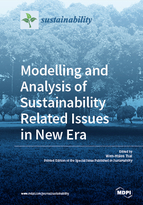Modelling and Analysis of Sustainability Related Issues in New Era
A special issue of Sustainability (ISSN 2071-1050).
Deadline for manuscript submissions: closed (31 December 2018) | Viewed by 84215
Special Issue Editor
Interests: sustainability; green production decision model; industry 4.0; corporate social responsibility (CSR); activity-based costing (ABC); enterprise resource planning (ERP); carbon emission cost; energy saving and carbon emission reduction; international financial reporting standards (IFRS)
Special Issues, Collections and Topics in MDPI journals
Special Issue Information
Dear Colleagues,
Smart Manufacturing of Industry 4.0 was first proposed at Hanover Fair, Germany, in 2011, which received a great deal of attention from various nations. Industry 4.0 utilizes new technologies, such as 3D printing, robots, and autonomous vehicles, and links all the components in the manufacturing systems using Cyber-Physical Systems (CPS) and the Internet of Things (IoT). Then, the system will, in real time, collect and monitor activity data from all the components and give intelligent responses to various problems that may arise in the factory by the real-time analysis results of cloud computing and big data. Finally, the manufacturing process can be fine-tuned, adjusted, or set up differently according to customer needs, in order to achieve the goal of mass customization and customer satisfaction. Under Industry 4.0, the Manufacturing Execution System (MES) is an online information system, a feedback and control system for production. Under Industry 4.0, there are great changes in production processes, production planning and control, quality assurance, internal control, cost determination, and other management issues. However, it is expected that it can create positive sustainability impacts along the whole value chain.
This Special Issue welcomes contributions on the modelling and analysis of sustainability-related issues in the new manufacturing environment (any phase from Industry 3.0 to Industry 4.0), including economic, social, and environmental dimensions of sustainability, and other related issues, such as green optimization, green sustainability modelling in various industries, sustainable manufacturing, sustainable development, sustainability reporting, sustainability accounting, energy saving and carbon emission reduction, etc. Both original research articles, as well as review articles, are welcome.
Prof. Dr. Wen-Hsien Tsai
Guest Editor
Manuscript Submission Information
Manuscripts should be submitted online at www.mdpi.com by registering and logging in to this website. Once you are registered, click here to go to the submission form. Manuscripts can be submitted until the deadline. All submissions that pass pre-check are peer-reviewed. Accepted papers will be published continuously in the journal (as soon as accepted) and will be listed together on the special issue website. Research articles, review articles as well as short communications are invited. For planned papers, a title and short abstract (about 100 words) can be sent to the Editorial Office for announcement on this website.
Submitted manuscripts should not have been published previously, nor be under consideration for publication elsewhere (except conference proceedings papers). All manuscripts are thoroughly refereed through a single-blind peer-review process. A guide for authors and other relevant information for submission of manuscripts is available on the Instructions for Authors page. Sustainability is an international peer-reviewed open access semimonthly journal published by MDPI.
Please visit the Instructions for Authors page before submitting a manuscript. The Article Processing Charge (APC) for publication in this open access journal is 2400 CHF (Swiss Francs). Submitted papers should be well formatted and use good English. Authors may use MDPI's English editing service prior to publication or during author revisions.
Keywords
- Green optimization
- Green sustainability modelling in various industries
- Sustainability in Industry 4.0
- Sustainable manufacturing
- Economic sustainability
- Social sustainability
- Environmental sustainability
- Sustainable development
- Sustainability reporting
- Sustainability accounting
- Corporate social responsibility
- Energy saving and carbon emission reduction






